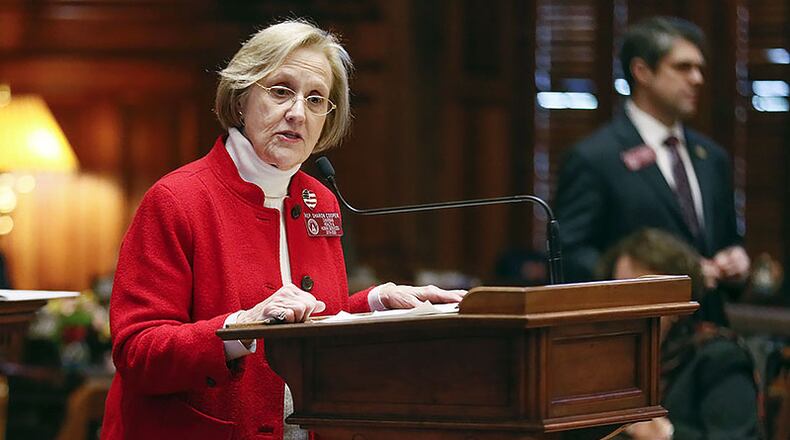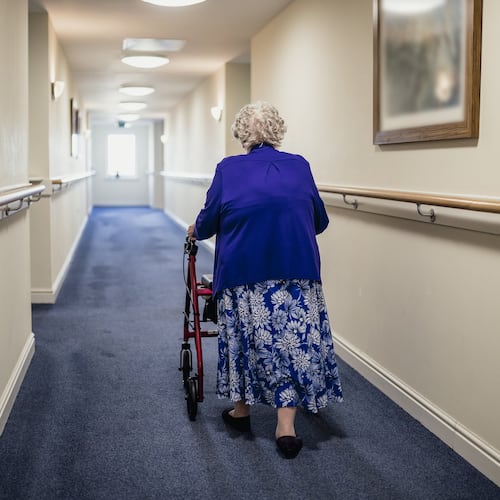The Georgia House sent a strong message that now is the time to protect the state's aging population when it overwhelmingly passed a senior care safety bill that would increase fines and require more staffing and training at assisted living and large personal care homes.
With the Senate scheduled to take up the bill in the coming weeks, a question still hangs over the reform effort: How far is Georgia willing to go to demand higher standards and accountability from the care industry that serves thousands of seniors?
» SEARCHABLE DATABASE: Details on every facility studied by the AJC
» MORE: The 'Unprotected' investigative series
Rep. Sharon Cooper, R-Marietta, the lead sponsor of the bill, said Georgia has many good assisted living facilities, but the industry also has players whose records demand that something change. The Atlanta Journal-Constitution highlighted many of those troubled homes in an investigation last fall, and a new AJC analysis includes hundreds of additional violations that state regulators made public in recent months.
“These people running substandard care that put our seniors at the possibility of being harmed or killed, they need to clean up their act ASAP or get out of town,” Cooper said. “Let a good manager or somebody that knows how to run a care business run a good facility. We’re an aging population, and we’re going to need more care facilities, but they need to be quality.”
Cooper has said the primary focus of House Bill 987 is to require facilities to have enough well-trained staff and management to deter abuse and neglect. Two other bills that have yet to pass either chamber are focused on identifying abuse and neglect when it does happen. Both are rooted in concerns that abuse and neglect often go undetected and unreported.
One proposal, House Bill 849, calls for families to be allowed to install so-called “granny cams” in rooms at nursing homes and assisted living facilities to monitor what’s going on with their loved ones. The bill has been stalled in the face of opposition from the nursing home and senior care industry, which has expressed concerns about resident privacy and the security of facility computer networks.
» RELATED: Prosecutors not alerted to potential crimes
» AJC BILL TRACKER: Follow the progress of the senior-care bill HB987
A second proposal would shore up mandatory reporting requirements in cases of suspected elder abuse, neglect and exploitation. Advocates for the elderly have expressed concern for years that deaths from elder abuse or neglect may not be receiving proper review. House Bill 955 would strengthen requirements for facility staff or law enforcement to notify a local coroner or medical examiner of a death in a long-term care facility that may be related to neglect — such as significant medication errors, untreated wounds, trauma or failure to provide requested medical care.
“It’s trying to ensure that if people are not receiving care or receiving bad care, that it gets a spotlight on it,” said Melanie McNeil, Georgia’s Long Term Care Ombudsman.
Another provision of the bill would move the failure to report abuse and neglect to the state’s criminal code section commonly used by law enforcement, which advocates hope will make it more likely that cases will be prosecuted.
In its review of recently posted inspection reports, the AJC found additional cases where potential crimes went unreported. It took eight months before the management at Antebellum Arlington Place reported a December 2018 case of abuse to the Bibb County sheriff’s office. The investigator noted that it was unclear why the facility “did not call police when the incident occurred.”
State regulators didn’t notify law enforcement either, although they detailed the incident in a January 2019 inspection report. Their report says surveillance video showed a caregiver elbowing a resident in the stomach when the resident tried to leave an activity room and the resident then striking the caregiver. State regulators said the two “tussled,” then the resident broke away but fell face first to the floor, losing two teeth.
“Obviously before you can investigate a case there has to be a report to law enforcement,” said Pete Skandalakis, the executive director the the Prosecuting Attorneys’ Council of Georgia, which supports the proposal. “You can have all the laws and mechanisms in place. But if that initial report doesn’t get made, the entire system comes to a standstill. Nothing happens. We need timely reports.”
State law now makes failure to report a misdemeanor. As introduced, the bill calls for making it a high and aggravated misdemeanor, which carries a potential fine of up to $5,000 and a sentence of up to 12 months in jail.
But that provision could be a source of tension in the debate over the bill. A committee hearing on the bill is scheduled for Monday, where some of these issues could get hashed out.
“We want a strong bill,” said Rep. Chuck Efstration, R-Dacula, who is sponsoring the legislation. “We have to weigh concerns and questions raised with the need to send a strong message that elder abuse will not be tolerated in Georgia.”
Tony Marshall, the president and CEO of the Georgia Health Care Association, which represents nursing homes and assisted living facilities, said his members are concerned a higher criminal penalty will cut into their ability to hire staff in an already tight labor market.
“When you make it a higher penalty for an employee in a center for failure to report it makes workforce recruitment and retention more difficult,” Marshall said.
24 violations, $1,803 fine
Cooper’s legislation, which is expected to be heard in the Senate sometime after this week, was a compromise between senior advocates and the fast-growing care provider industry. The bill has broad support, including from Gov. Brian Kemp and even many in the industry itself.
“We’re supporting Rep. Cooper’s bill because it seeks to strike a balance between new regulations to protect seniors while recognizing there are thousands of positive outcomes in our communities each year,” said Genia Ryan, president and CEO of the Georgia Senior Living Association.
» RELATED: Lax oversight, low fines
Cooper patterned her bill on many of the findings in the AJC series that published last fall, and she has publicly credited the newspaper for raising awareness across the state.
“Families now know what goes on in these places,” Cooper said. “It’s been put out in very shocking ways.”
Rep. Calvin Smyre, D-Columbus, recounted a tragic story from the series when he spoke Feb. 28 on the House Floor before the chamber voted 160-1 to adopt the reforms.
A significant component of the AJC's investigation was creation of a consumer website with thousands of inspection reports over a four-year period dating back to 2015. The AJC's system flagged roughly one in five assisted living and large personal care facilities as having a significant history of violations and breakdowns in care.
The AJC’s updated analysis of hundreds of inspection reports that the state Department of Community Health made public in recent months involved close to 1,000 additional violations.
Savannah Grand of Columbus is one of the facilities that stood out for poor inspections in the most recent reports, and its record is emblematic of many problems the AJC uncovered its in 2019 investigation.
The assisted living facility’s website promises “exceptional care” for seniors in a “gracious” setting that offers a movie theater and “grand dining room.” But state inspectors in December 2018 and June 2019 documented rampant understaffing that strained care. Among other violations in four inspection reports, workers in the memory care unit weren’t trained on caring for people with dementia. Some staff weren’t trained on infection control and other safety issues. Three residents with serious conditions weren’t given their prescriptions because the home didn’t order refills. Fire drills weren’t done, and the home didn’t report serious injuries as required.
Staff at Savannah Grand of Columbus failed to make required reports to police or the state after one resident with dementia left the facility unnoticed, according to a state report. One person told inspectors of having to take a parent home on weekends, “because the facility was short staff and not able to care for the residents.”
While the Savannah Grand had one of the worst inspections of 2019, with 24 violations cited in one June inspection, the state notified the facility of a $1,803 fine, records show.
Senior Living Management, which operates Savannah Grand of Columbus, told the AJC in a statement that its goal is “to provide the highest quality of care possible.” The company, which also operates homes in Louisiana and Florida, said it partners with state agencies and strives to be compliant with state rules.
It initially told the AJC last Tuesday that it had corrected all its deficiencies from the June survey and had not received a deficiency since that time.
However, the AJC found that statement didn’t match state inspection records. State surveyors went back to Savannah Grand in August, September and December and found additional violations, according to state reports.
The company in a follow-up statement on Thursday acknowledged the additional violations and said it is committed to fixing the problems.
“Senior Living Management has made a change at the executive director position at Savannah Grand of Columbus to a more qualified leader,” the company said. “We will continue to support the new leadership to provide the best care possible.”
Residents at risk
The abuse case at Antebellum Arlington Place was among 180 cases detailed in the recent inspection reports where violations resulted in residents being harmed or placed at high risk. The reports on assisted living communities and large personal care homes revealed roughly 20 new cases of abuse in addition to the 90 cases that the AJC identified in its investigation last year. The new reports also include about 65 citations involving medication errors, 45 incidents where residents with dementia went missing, more than 30 fire safety infractions, and numerous other violations that put residents of the state’s senior care homes at risk.
According to an April 2018 report only recently posted on the Department of Community Health's regulatory website, a worker at Benton House of Decatur heard an "unusual scream" and witnessed another worker shoving a resident against a wall, causing the resident's face to be pressed against a picture frame. The worker was fired and the abuse reported to police, but inspectors found the employee had not been trained about the rights of residents.
"You can have all the laws and mechanisms in place. But if that initial report doesn't get made, the entire system comes to a standstill." —Pete Skandalakis, executive director the the Prosecuting Attorneys' Council of Georgia
Benton House officials said they took appropriate action, and they dispute the assertion that the employee wasn’t properly trained.
“There were no injuries and all internal and (police) investigations were unable to substantiate the concern,” said Hollie Reineke, the facility’s executive director. “Regardless, we let the employee in question go out of an abundance of caution.”
At Thrive at Green Island in Columbus, an incident occurred in the middle of the night last November where a worker in a memory care unit shoved a resident with Alzheimer’s who was being aggressive, state records state. The resident fell backward and hit the floor, and the worker then drew a fist and swung at the resident, without making contact. Three other workers were in the room and did not help the resident, but just watched while the resident got up. Some workers had not received training to work on the memory care unit, a state inspector found.
An employee at the facility declined to comment last week.
Last year, a state inspector discovered a Gardens of Savannah resident with dementia and diabetes had been hospitalized three times in 2019 for ketoacidosis — a serious complication of diabetes. In at least one instance, a worker who had administered the wrong dosage of insulin to the resident was not properly trained, records show. DCH last October cited the home for neglect in the case. The facility declined to comment.
Those supporting the senior care reform bill see these kind of incidents as the reason new standards and more accountability are needed.
"With the great increase in the number of older Georgians living in assisted living and personal care homes, greater protections are crucial," said Kathy Floyd, executive director of the Georgia Council on Aging. "It's the perfect storm of intensifying need and the public attention and a group of legislators motivated to make change."
The Latest
Featured







